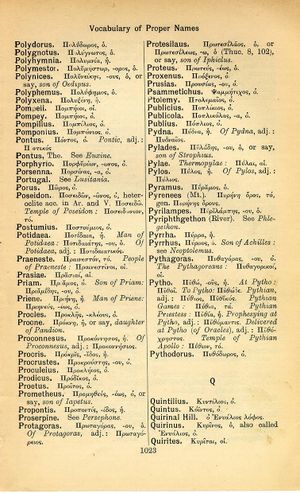Pydna
Χριστὸς ἀνέστη ἐκ νεκρῶν, θανάτῳ θάνατον πατήσας, καὶ τοῖς ἐν τοῖς μνήμασι, ζωὴν χαρισάμενος → Christ is risen from the dead, trampling down death by death, and upon those in the tombs bestowing life
English > Greek (Woodhouse)
Πύδνα, ἡ.
Of Pydna, adj.: Πυδναῖος.
Latin > English (Lewis & Short)
Pydna: ae, f., = Πύδνα,
I a city in Macedonia, on the Thermaic Gulf (the modern Kitro), celebrated for the battle in which Perseus was defeated by Æmilius Paulus, Liv. 44, 6, 3; 44, 42, 2 sqq.; Nep. Them. 8, 5.—Pydnaei, ōrum, m., the inhabitants of Pydna, Liv. 44, 45.
Latin > French (Gaffiot 2016)
Pydna,¹⁶ æ, f. (Πύδνα), ville maritime de Macédoine : Nep. Them. 8, 5 ; Liv. 44, 6, 3 ; Plin. 4, 34 || -næī, ōrum, m., habitants de Pydna : Liv. 44, 45.
Latin > German (Georges)
Pydna, ae, f. (Πύδνα), eine Stadt in Mazedonien, am thermäischen Meerbusen, wo Paulus Ämilius 168 v. Chr. den mazedon. König Perseus schlug, wahrsch. an der Stelle des h. Ayan, Nep. Them. 8, 5. Liv. 44, 6, 3; 44, 42, 2 sqq. – Dav. Pydnaeī, ōrum, m. (Πυδναιοι), die Einw. von Pydna, die Pydnäer, Liv. 44, 45, 6.

